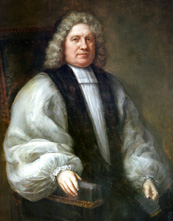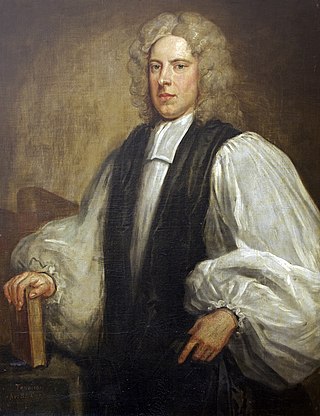
Hugh Boulter was the Church of Ireland Archbishop of Armagh, the Primate of All Ireland, from 1724 until his death. He also served as the chaplain to George I from 1719.

Narcissus Marsh was an English clergyman who was successively Church of Ireland Bishop of Ferns and Leighlin, Archbishop of Cashel, Archbishop of Dublin and Archbishop of Armagh.

The Dean of St Patrick's Cathedral is the senior cleric of the Protestant St Patrick's Cathedral, Dublin, elected by the chapter of the cathedral. The office was created in 1219 or 1220, by one of several charters granted to the cathedral by Archbishop Henry de Loundres between 1218 and 1220.
The Anglican Archbishop of Armagh is the ecclesiastical head of the Church of Ireland, bearing the title Primate of All Ireland, the metropolitan of the Province of Armagh and the diocesan bishop of the Diocese of Armagh.
Events from the year 1678 in Ireland.

Euseby Cleaver was the Church of Ireland Bishop of Ferns and Leighlin (1789–1809) in Ireland and subsequently Archbishop of Dublin (1809-1819).
Arthur Price was Church of Ireland Archbishop of Cashel from 1744 until his death. Previously he had been Church of Ireland Bishop of Clonfert (1724–1730), Ferns and Leighlin (1730–1734) and Meath (1734–1744).

John Allen Fitzgerald Gregg CH (1873–1961) was a Church of Ireland clergyman, from 1915 Bishop of Ossory, Ferns and Leighlin, in 1920 translated to become Archbishop of Dublin, and finally from 1939 until 1959 Archbishop of Armagh. He was also a theologian and historian.

Joseph Trapp (1679–1747) was an English clergyman, academic, poet and pamphleteer. His production as a younger man of occasional verse and dramas led to his appointment as the first Oxford Professor of Poetry in 1708. Later his High Church opinions established him in preferment and position. As a poet, he was not well thought of by contemporaries, with Jonathan Swift refusing a dinner in an unavailing attempt to avoid revising one of Trapp’s poems, and Abel Evans making an epigram on his blank verse translation of the Aeneid with a reminder of the commandment against murder.

Richard West was an English barrister, judge, playwright and politician who sat in the House of Commons from 1721 to 1726. He served as Lord Chancellor of Ireland from 1725 to 1726, succeeding Alan Brodrick, 1st Viscount Midleton.
John Godfrey Fitzmaurice Day was a 20th-century Church of Ireland Archbishop.

Thomas Elrington was an Irish academic and bishop. He was Donegall Lecturer in Mathematics (1790-1795) at Trinity College Dublin (TCD). While at TCD he also served as Erasmus Smith's Professor of Mathematics (1795–1799) and as Erasmus Smith's Professor of Natural and Experimental Philosophy (1799–1807). Later, he was Provost of Trinity College Dublin (1811-1820), then Bishop of Limerick, Ardfert and Aghadoe (1820-1822), and finally Bishop of Ferns and Leighlin till his death in Liverpool in 1835.
Charles Richard Elrington (1787–1850) was a Church of Ireland cleric and academic, regius professor of divinity in the University of Dublin.

Edward Tenison (1673–1735) was an English bishop of Ossory. An example of the workings of the system of patronage in the Church of England, Tenison also was a significant Whig and controversialist.
Edward Synge (1691–1762) was an Anglican bishop in the Church of Ireland who was the Bishop of Clonfert and Kilmacduagh (1730–1732), Bishop of Cloyne (1732–1734), Bishop of Ferns and Leighlin (1734–1740) and Bishop of Elphin (1740–1762).

William Robertson (1705–1783) was an Irish clergyman, known as a theological writer and schoolmaster. Theophilus Lindsey wrote of Robertson as "the father of unitarian nonconformity".
Sir Thomas Burdett, 1st Baronet was an Irish politician and baronet.
Thomas Rundle (c.1688–1743) was an English cleric suspected of unorthodox views. He became Anglican bishop of Derry not long after a high-profile controversy had prevented his becoming bishop of Gloucester in 1733.











